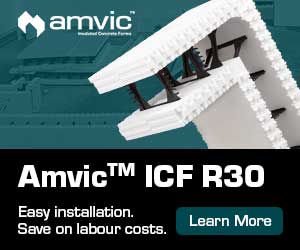The right tool makes any job easier. From hand tools to estimating programs, the professional ICF installer recognizes that good tools will save money, time, and hassles on the jobsite.
In the June 2009 issue of this magazine, Ian Geisler wrote, “Tools can provide the contractor with a competitive speed advantage, reduced overhead and greater profit potential. Some tools that lead to a better ICF install and lower labor costs are almost common sense. Other tool purchases require closer scrutiny because the savings are unknown until the tool has been used for a few jobs. These are usually the tools that users will look back and say, ‘how did we get along without it?’ ”
Braces
Perhaps the most essential tool for the installer is a good set of braces. Shane Nickel, president of Reechcraft, used to tell contractors, “When you buy a load of forms, you have a project. When you buy a load of braces, you have a business.” Typically it’s one brace for every five or six feet of wall, with additional braces on each side of the windows, doors, and corners. Reechcraft pioneered the steel turnbuckle brace nearly 20 years ago. Today, quality bracing is available from a number of different companies, each with slightly different features.
 Giraffe Brace and Plumwall, for instance, are stored in metal crates that keep all the parts organized and make moving large amounts of bracing quick and straightforward. Plumwall braces can be adjusted from the walkway at the top of the scaffold, making it possible for a single worker to quickly bring the wall into plumb. If the brace includes integral safety rails and other safety features, it will save time in the long run.
Giraffe Brace and Plumwall, for instance, are stored in metal crates that keep all the parts organized and make moving large amounts of bracing quick and straightforward. Plumwall braces can be adjusted from the walkway at the top of the scaffold, making it possible for a single worker to quickly bring the wall into plumb. If the brace includes integral safety rails and other safety features, it will save time in the long run.
Installers that complete only a few projects per year may find it more cost-effective to rent bracing as needed.
Vibrators
Good concrete consolidation is essential for strong, energy-efficient ICF walls, and studies have shown that unless a super-low-slump concrete is used, the only way to ensure adequate consolidation is with a pencil-head concrete vibrator.
 Fred Oswald, president of Oztec Industries, generally recommends a ¾”-diameter tip for ICFs. As with bracing, operator knowledge is every bit as important as good equipment.
Fred Oswald, president of Oztec Industries, generally recommends a ¾”-diameter tip for ICFs. As with bracing, operator knowledge is every bit as important as good equipment.
Oztec also makes a rebar shaker that uses the same engine as the internal vibrator. It slips over the top of the vertical rebar, effectively converting the entire steel rod into a vibrator. “The rebar shaker will give you very good results if the rebar is fairly close together, about 12 or 14 inches,” Oswald says. At wider spacings, it needs to be augmented by a pencil vibrator. He notes that this method produces excellent bonding to the rebar, and is great for congested areas—like lintels—that would be hard to get a pencil vibrator into.
Power Tools
In seismic zones and other areas that require extensive rebar, cutters, benders, and tying machines make a huge difference in productivity. Cordless rebar tie tools are expensive, but the labor savings may pay for the tool within the first few projects.
 Pneumatic rebar cutters and benders typically run $2,000 to $4,000 but it can reduce steel costs by 20% and give the installer the ability to fabricate nearly any shape in seconds.
Pneumatic rebar cutters and benders typically run $2,000 to $4,000 but it can reduce steel costs by 20% and give the installer the ability to fabricate nearly any shape in seconds.
Other power tools the ICF professional should consider include a table saw to rip forms (instead of a circular or reciprocating saw), a hot knife for cutting utility channels, and a electric or cordless drill. Serious contractors will also find a hammer drill useful for setting concrete anchors and retrofitting rebar.
Hand Tools
The list of essential hand tools is not lengthy, and the entire collection would fit into a five-gallon bucket. These include a good folding handsaw, plus a keyhole saw for embeds and hanger plates; a spirit level, laser level, chalk line, and mason’s twine for layout; tape measure, framing square, marking pen, and utility knife; hammer, rebar tie tool, pliers and screwdriver; foam guns, foam cartridges, and cleaner; and other basics like work gloves, sunscreen, and a broom for cleanup.
 Nearly all of these tools are available at hardware stores and building supply centers across the U.S. and Canada. Wind-Lock, a specialty supplier, carries all the basics plus a complete line of ICF accessories including hot knife kits and foam guns.
Nearly all of these tools are available at hardware stores and building supply centers across the U.S. and Canada. Wind-Lock, a specialty supplier, carries all the basics plus a complete line of ICF accessories including hot knife kits and foam guns.
In the end, the best way to determine if a tool reduces time and expense is to keep informed of the tools on the market and try them out.








